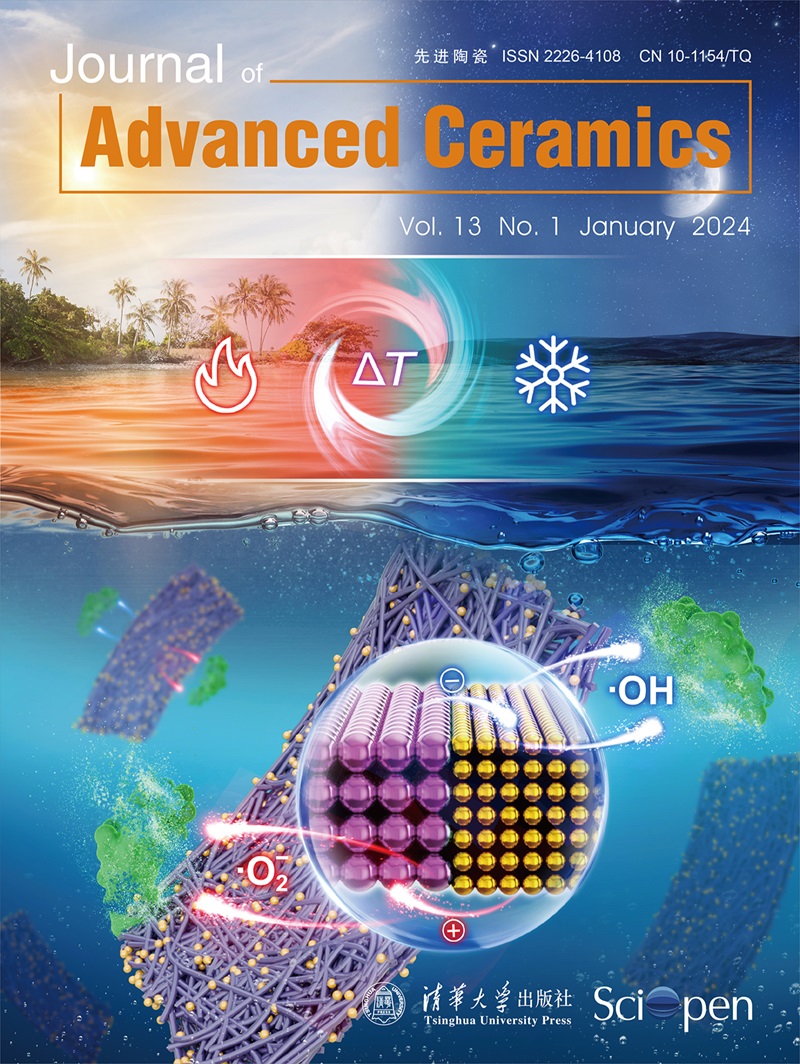From binary to ternary and back to binary: Transition of electromagnetic wave shielding to absorption among MAB phase Ni 3ZnB 2 and corresponding binary borides Ni n +1B n ( n= 1, 3)
IF 16.6
1区 材料科学
Q1 MATERIALS SCIENCE, CERAMICS
引用次数: 0
Abstract
Due to the chemical inertness of nickel and boron, the preparation of nickel borides and corresponding layered ternary transition metal borides Ni3ZnB2 (MAB phase) has always required high-temperature and/or high-pressure conditions. Yet, an innovative and efficient approach to prepare Ni3ZnB2 at only 600 °C and without applied pressure is presented in this study. It is discovered that by simply adjusting the temperature, a phase transition from Ni3ZnB2 to Ni4B3 with a layered structure could be induced. This transition between binary-component and ternary-component brings about significant variation of electromagnetic wave (EMW) shielding/absorption performance of prepared borides. For instance, Ni2B is of good EMW shielding performance (42.54 dB in X band) and Ni3ZnB2 is of weak EMW shielding (13.43 dB in X band); Ni3ZnB2 has poor EMW absorption performance (-5 dB) while Ni4B3 has excellent EMW absorption performance (-45.19 dB) at a thickness of 2.7 mm with effective absorption bandwidth (10.4 GHz).从二元到三元再回到二元:MAB相Ni 3ZnB 2与对应的二元硼化物Ni n +1B n (n= 1,3)之间电磁波屏蔽到吸收的转变
由于镍和硼的化学惰性,制备硼化镍及其相应的层状三元过渡金属硼化物Ni3ZnB2 (MAB相)一直需要高温和/或高压条件。然而,在本研究中提出了一种创新和有效的方法来制备Ni3ZnB2,仅需600°C,无需施加压力。发现通过简单的温度调节,可以诱导Ni3ZnB2向具有层状结构的Ni4B3相变。这种二元组分和三元组分之间的转变使制备的硼化物的电磁波屏蔽/吸收性能发生了显著变化。Ni2B具有良好的EMW屏蔽性能(X波段为42.54 dB), Ni3ZnB2具有较弱的EMW屏蔽性能(X波段为13.43 dB);Ni3ZnB2具有较差的EMW吸收性能(-5 dB),而Ni4B3具有较好的EMW吸收性能(-45.19 dB),厚度为2.7 mm,有效吸收带宽为10.4 GHz。
本文章由计算机程序翻译,如有差异,请以英文原文为准。
求助全文
约1分钟内获得全文
求助全文
来源期刊

Journal of Advanced Ceramics
MATERIALS SCIENCE, CERAMICS-
CiteScore
21.00
自引率
10.70%
发文量
290
审稿时长
14 days
期刊介绍:
Journal of Advanced Ceramics is a single-blind peer-reviewed, open access international journal published on behalf of the State Key Laboratory of New Ceramics and Fine Processing (Tsinghua University, China) and the Advanced Ceramics Division of the Chinese Ceramic Society.
Journal of Advanced Ceramics provides a forum for publishing original research papers, rapid communications, and commissioned reviews relating to advanced ceramic materials in the forms of particulates, dense or porous bodies, thin/thick films or coatings and laminated, graded and composite structures.
 求助内容:
求助内容: 应助结果提醒方式:
应助结果提醒方式:


